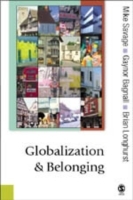'Globalization and Belonging's headline message - that place matters, that locality remains vital to people, is arresting' - Frank Webster, Professor of Sociology, City University, London
Drawing on long-term empirical research into cultural practices, lifestyles and identities, Globalization and Belonging explores how far-reaching global changes are articulated locally.
The authors address key sociological issues of stratification as analysis alongside 'cultural' issues of identity, difference, choice and lifestyle. Their original argument:
"Shows how globalisation theory conceives of the 'local'
"Reveals that people have a sense of elective belonging based on where they choose to put down roots
"Suggests that the feel of a place is much more strongly influenced by the values and lifestyles of those migrating to it
"reinvigorates debates in urban and community studies by recovering the 'local' as an intrinsic aspect of globalisation
Theoretically rigorous, the book is brought to life with direct quotations from the authors' research, and appeals to students in urban sociology, urban geography, media studies and cultural studies.

